2017江西省宜春市中考英语试题(word版 含答案)
为了方便您的阅读请点击右上角全屏查看
一、听力测试(27分)
现在是试听时间。请听一段对话,然后回答问题。
What is the boy going to buy?
A. Some juice. B. Some oranges. C. Some apples.
答案是C。
A)请听下面8段对话。每段对话后有一小题,从题中所给的A、B、C三个选项中选出最佳选项,并在答题卡上将该项涂黑。听完每段对话后,你都将有10秒钟的时间回答有关小题和阅读下一小题。每段对话读两遍。(每小题1分)
1. Where does the woman live?
A. In the town. B. In the city. C. In the mountains.
2. What time will Sally and Kevin meet this Sunday?
A. At six. B. At seven. C. At eight.
3. Who has a fever?
A. Jim. B. Michael. C. Michael’s mother.
4. What will Lily do?
A. Go fishing. B. Go for a snack.C. Go hiking.
5. How is the weather tomorrow?
A.Windy. B. Rainy. C.Sunny.
6. Why is Tom feeling sad?
A.Because he failed the English exam.
B.Because he has no friends to talk with.
C.Because he doesn't know whom to talk with.
7. How much will the man pay?
A. $2.15. B. $2.50. C.$5.00.
8. What does the woman mean?
A.It's time to go to bed.
B.It's too early to go to bed.
C.She has too much work to do.
B)请听下面5段对话或独白。每段对话或独白后有几个小题,从题中所给的A、B、C三个选项中选出最佳选项,并在答题卡上将该项涂黑。听每段对话或独白前,你将有时间阅读各个小题,每小题五秒钟;听完后,各小题给出5秒钟的作答时间。每段对话或独白读两遍。(每小题1分)
请听第1段材料,回答第9、10小题。
9. How did the man go to New York?
A. By plane. B. By train.C. By car.
10. What does he think of his trip?
A. Boring. B.Dangerous. C.Interesting.
请听第2段材料,回答第11、12小题。
11. What does the girl want to be?
A. A guide. B. A teacher. C. A volunteer.
12. How long have they been in the school?
A. For one year. B. For two years. C. For three years.
请听第3段材料,回答第13至第15小题。
13. What does Bill want to invite Mary to do?
A. Watch an opera. B. Watch a movie. C.Watch s game.
14. Where did Bill get the tickets?
A. From the manager. B . From his friend. C.From his sister.
15. Which of the following is true?
A. Bill works at a movie theater.
B. Mary isn't sure if she can go.
C. The manager will go with them.
请听第4段材料,回答第16至第18小题。
16. What does James like lo watch on TV?
A. Sitcoms. B.Comedies. C.Talk shows.
17. When does James usually watch them?
A. On Friday. B.On Saturday. C.On Sunday.
18. What do we know about Lucy and her family?
A. She likes watching cartoons best.
B. Her parents often go on business.
C. There are over two TV sets in her family.
请听第5段材料,回答第19至第22小题。
19. When does Amy's father get up?
A. At 5:30. B.At 6:30. C.At 7:30.
20. What does he feed to the elephants?
A. Carrots and potatoes. B. Bananas and carrots. C. Tomatoes and cabbages.
21. What does he do in the afternoon?
A. He cleans the elephant house.
B. He gives the elephants a bath.
C. He helps the elephants exercise.
22. What can we learn from the monologue?
A. Amy's father is tired of his job now.
B. Amy’s father has been a zookeeper for years.
C. Amy’s father looks after two elephants in the zoo.
C)请听下面一段独白,根据独白内容完成下列句子,每个空格不超过3个单词。将答案填写到答题卡的相应位置。听独白前你将有50秒钟的时间阅读句子内容。独白读两遍。(每小题1分)
23. They want to paint the school’s again.
24. Some students like the bright colors and .
25. Many others say they need .
26. in the competition will design the large side wall.
27. The monitor’s telephone number is .
二、单项填空(8分)
请阅读下面各小题.从题中所给的A、B、C、D四个选项中选出可以填人空白处的最佳选项.并在答题卡上将该项涂黑。(每小题1分)
28. We must get back to work, we won't finish everything.
A. And B.but C. so D. or
29. Sleeping is a good thing, but some people sleep .
A. easily B. badly C. quickly D. well
30. -Do you have any for tonight yet?
-Not yet. What about having a picnic on the beach?
A. problems B. news C. plans D. rules
31. I've just returned from my trip to London. I many interesting places there.
A. visit B. will visit C. am visiting D. visited
32. -I want to buy a shirt. But I have a little money.
-The shirts here are all very cheap. And the yellow one is . Do you like it?
A.cheap B. cheaper C. the cheapest D. expensive
33.Would you like to see a movie with me on Saturday night?
Sorry, I didn’tit. Could you please say it again?
A. receive B. catch C. find D. finish
34. Since we began to use the Internet, our lives a lot.
A. change B. had changed C. will change D. have changed
35. A baby's first month birthday is a special event in China and with a special
party.
A. is celebrated B. is celebrating C. was celebrated D. celebrates
三、完形填空(25分)
A)请先阅读下面短文,掌拥其大意,然后从各小题所给的A、B、C、D四个选项中选出可以填人相应空白处的最佳选項,并在答題卡上将该项涂黑。(每小题1分)
Each one of us shares this planet with seven billion others. And we all need 36 . People and products need to move from city to city and country to country. However,we all know 37 most cars, motorcycles, boats and planes cause air pollution. They are also 38 . This is a serious problem in many cities. 39
inventors are coming up with creative ideas to try to reduce the pollution and noise.
In many cities around the world, motorcycles are very 40 . Now Vietnam has around 33 million motorcycles and China has almost 120 million. Motorcycles are a faster and cheaper way to get around a city than 41 . Yet air pollution is a growing problem. In large cities, people 42 it is difficult to breathe. To solve these problems, a U.S. company designed an environmentally friendly motorcycle, It uses electricity as fuel(燃料). As a result, there is 43 pollution. It's also quiet and fast. This makes 44 a good choice for getting around a city.
The Italian city of Venice is a city with only a few 45 . There are no cars in the city center. 46 cars, water taxis and buses carry people along the city’s canal(运河). However, they cause pollution, 47 to the water. English engineers Dick and Jem designed a solar-powered(太阳能)water taxi. The water taxi 48
run for a day after being recharged(充电).
Planes also cause air and noise pollution. Designing an environmentally friendly airplane is a real 49 . Some airplane companies have 50to solve the problems. Swiss engineers have gone one step further. They developed a solar airplane. This plane holds the world record for the longest solar-powered flight-1,541 kilometers from Arizona to Texas in America.
36. A. air B. food C. transportation D. communication
37. A. how B. why C. when D. that
38. A. noisy B. dirty C. fast D. expensive
39. A. Since B. So C. BecauseD. Although
40. A. popular B. valuable C. dangerous D. safe
41. A. bikes B. subways C. buses D. cars
42. A. explain B. complain C. doubt D. promise
43. A. much B. some C. no D. more
44. A. them B. you C. us D. it
45. A. rivers B. roads C. tourists D. people
46. A. Instead of B. Thanks to C. Because of D. As for
47. A. probably B. only C. especially D. hardly
48. A. must B. can C. should D. need
49. A. question B. job C. decisionD. challenge
50. A. disagreed B. refused C.started D. remembered
B)请先阅读下面短文,掌握其大意。然后用方框中所给的词的适当形式填空,并将答案填写到答题卡的相应位置。每个词限用一次。(每小题1分)
![]() VI hen people hear the word stress, they usually think of
VI hen people hear the word stress, they usually think of
 When people hear the word stress, they usually think of something bad. However, stress can have several benefits(益处)for the body and mind. To begin with, people may feel stressed 5I__there is something important to do. For example, some students are stressed before a big test. The stress might make them feel 52 ,but it also makes them focused. This type of stress can help people work efficiently(高效地)to meet their 53 .
When people hear the word stress, they usually think of something bad. However, stress can have several benefits(益处)for the body and mind. To begin with, people may feel stressed 5I__there is something important to do. For example, some students are stressed before a big test. The stress might make them feel 52 ,but it also makes them focused. This type of stress can help people work efficiently(高效地)to meet their 53 .
Another way stress benefits us is by keeping us healthy. Scientists who study stress learnt a little stress can 54 the immune system(免疫系统)stronger. When your body learns to respond (反应)to some stress,it’s able to 55 you better from illness.
The final way that stress benefits us is by helping us respond to 56 . If you see a car coming around the corner too fast, you might experience stress. This stress sends a message 57 your brain of danger, allowing your body to respond 58 . You may not be able to jump out of the car's way soon enough 59 the stress.
Of course, too much stress is 60 to our bodies and minds. But the right amount of stress makes us more efficient, healthier and safer.
阅读理解(40分)
A)请阅读下面短文,根据短文内容从每小题所给的A、B、C、D四个选项中选出最佳选项,并在答题卡上将该项涂黑。(每小题2分)
A
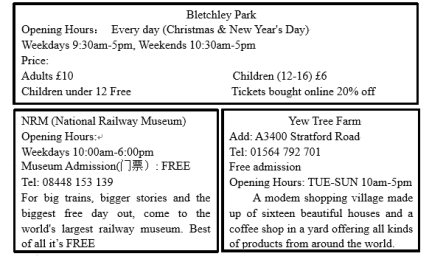
61. When can we visit National Railway Museum?
A. On weekdays. B. On Sundays.
C. On Saturdays D. Every day.
62. Where can we shop and enjoy a cup of coffee?
A. In Bletchley Park. B. On Yew Tree Farm.
C.At National Railway Museum. D. On the big trains in NRM.
63. Which of the following is TRUE?
A.Bletchley Park has the longest daily opening hours.
B.We can email Yew Tree Farm for more information.
C. We can visit National Railway Museum at nine thirty.
D. An adult can buy a ticket to Bletchley Park online for £8.
B
![C:\Users\鱼仔\AppData\Roaming\Tencent\Users\375123902\QQ\WinTemp\RichOle\7NQI@]BFVB4K@6[VZ}27V(6.png](http://img.chusan.com/upLoad/doc2017/b9t412eq/184130.004.png) “Color, color, color!” are the words of artist Eric Carle.
“Color, color, color!” are the words of artist Eric Carle.
Eric is like the king in the world of children's books. He has written over 70 children's books. His most famous book, The Very Hungry Caterpillar, is common on children's bookshelves all over the world. What most people don't know is that Eric also makes art for adults, which is called “ArtArt”. People didn't know about it, because he didn't show it to the public until he was 84 years old!
Like Eric's children's books, his “ArtArt” is full of bright and clear color. He says that he loves color so much because he missed it during the war in Germany. Eric was born in New York in 1929, but moved to Germany with his family when he was 6. When he was 10, World War II began. He noticed that all the houses and buildings in his town were painted grey, brown or dark green. It was a sad time, and it seemed like there was no color anywhere.
At the end of the war, “when color came back”, Eric explains, “I just loved it so much. I keep saying that I wish our eyes could see more color. Color is a very important part of my work."
That's true. Eric paints bright colors on paper, cuts out shapes, and then glues them onto another piece of paper. This method is called collage. In fact, it is what led Eric to his “ArtArt”.
Eric's “ArtArt” includes large collages as well as paintings, photographs and even costumes. In all these works, he uses all kinds of colors - everything from purple to light green to orange. Now that's a lot of color!
64. When did Eric show “ArtArt” to the public?
A. In 1929. B. In 1993. C. In 1997. D. In 2013.
65. Why did Eric feel sad during World War II?
A. Because he could hardly see bright color.
B. Because he had to join the army to fight.
C. Because he couldn't draw very good paintings.
D. Because he lived a very poor life with his parents.
66. Which of the following is TRUE according to the passage?
A. Collage plays an important part in Eric's book “ArtArt”.
B. Children know little about The Very Hungry Caterpillar.
C. Eric has created more books for adults than for children.
D. Eric moved to Germany with his family when he was 10.
67. What's the main idea of this passage?
A. Eric created collages for his books.
B. Eric's “ArtArt” is popular with people.
C. Eric's love for color led him to success.
D. Eric is the king in the world of children's books.
C
It seems like technology is everywhere. Computers and smart phones are at the center of almost everything we do. They constantly(持续地)require our attention. We text our friends with them during the day, sleep with them by our beds and check our messages as soon as we wake up.
In the future, technology will no longer be interrupting us all the time. Instead, we will use calm technology which was first developed by scientist Mark Weiser in the 1970s. In his opinion, calm technology works quietly but constantly. We know it is there, but we don't pay much attention to it According to Mark, the beat technology should be invisible(隐形的)and let you live your life.
We already use many different types of calm technology in our everyday lives. Do you have a smoke alarm in your house? That smoke alarm is always there, checking the air for smoke and quietly keeping you safe. It only reminds you it's there when you’ve burnt your bread! Or there may be lights in your home or school. When somebody passes in front of their sensors(传感器), the lights turn on. You don’t think about this type of technology until you see the light go on.
In the future, we can imagine our houses will use calm technology to open the curtains for us in the morning, to tum down the heat when we leave, or even to choose the best music for our mood The minute we walk through the door, our house will respond by turning on the lights and music, and perhaps even starting to prepare our dinner!
68. Which of the following is an example of calm technology?
A. A computer. B. A smart phone. C. A smoke alarm. D. A radio.
69. What does the underlined word “interrupting" mean?
A. Hurting. B. Protecting. C. Helping. D. Troubling.
70. What’s the main idea of the third paragraph?
A. Calm technology keeps us safe in many ways.
B. Calm technology can help you to do housework.
C. Calm technology has been used in our daily lives.
D. Calm technology plays an important part in schools.
71. What can we infer from the passage?
A. The light won't go on unless we touch the sensor.
B. Calm technology will make our life more convenient.
C. People will depend more on smart phones in the future.
D. People won't have to work because of calm technology.
D
Being a teenager can be challenging, but it can also be exciting. You*re becoming more independent and making decisions for yourself. You are also learning to take risks and solve problems better. And changes are happening throughout your body, even in your brain.
The changes in your brain are influencing how you develop into an adult. Imagine the structure(结构)of your brain is like a big road map. Lots of roads lead to different destinations(目的地). When you were a child as you learnt new things, your brain created more and more roads to different destinations. By the time you become a teenager, many different roads lead to the most important places on the map. Now your brain's job is to make that map more efficient.
As a result, your experiences as a teenager actually influence the way that your brain develops. If you spend hours playing video games, what skills do you use? You learn to see something with your eyes and respond to it with your hands. As you develop those skills, your brain is making sure that the roads leading to them are especially fast and efficient. So, your video-game playing could be preparing you for a career such as a pilot.
This is a great time for you to practice new skills and discover what you're good at and try what you love doing. Go out and try different activities, and stick to them if
you think they’re useful. Remember that with everything you do, you’re shaping your brain for the future.
72. What happens as children learn new things?
A. Their brains make the maps more efficient.
B. The structures of their brains are like big road maps.
C. Their brains create more roads to different destinations.
D. Many different roads lead to the most important places.
73. What does the underlined word “it” in Paragraph 3 refer to?
A. Your brain. B. Something you see.
C. Your skill. D. Something you learn.
74. What’s the writer’s advice for teenagers?
A. Teenagers should learn to be more independent.
B. Teenagers should work harder and more efficiently.
C. Teenagers should play more video games in order to be a pilot.
D. Teenagers should experience more and stick to the useful activities.
75. Which would be the beat title for the passage?
A. Making Decisions for Yourself. B.Developing Your Brain for the Future.
C. Ways of Changing Your Brain. D. Changes Happening in Your Brain.
B)请先阅读下面短文,掌捤其大意,然后根据短文内容从下面方框内的七个选项中选择五个还原到文中。使短文意思通順、结构完整,并在答题卡上将其序号涂黑。(每小题2分)
A problem is only a problem until there is a solution(解决办法).  We find solutions by thinking creatively. 76 In other words, we think outside the box. Sometimes, thinking outside the box solves not just one, but two problems.
We find solutions by thinking creatively. 76 In other words, we think outside the box. Sometimes, thinking outside the box solves not just one, but two problems.
Amsterdam is one of the most crowded cities in Europe. As a result, housing is very expensive,especially for students. 77However, finding this type of apartments was almost impossible until recently.
While the colleges in Amsterdam were trying to solve the housing problem, thousands of shipping contains(集装箱)were lying quietly in ports(港口)around the world. These huge steel containers carry products from one country to another. The life of each container is about 10 years. 78 Yet they can't recycle all of them because there are so many.
Back in Amsterdam, a company came up with an amazing idea. Why not reuse these shipping containers as student apartment? 79 They are all the same size and fit together perfectly. The steel is strong. Moreover, these containers are so widely available that they are quite cheap to buy. For all these reasons, they can be used to build apartments quickly and cheaply. Building began in 2005, and after only a few weeks, hundreds of Amsterdam students had new homes.
When students first heard about this idea, they thought the container apartments would be small, noisy, and cold. 80 Each container apartment has a kitchen, a bedroom with a study area, and a bathroom. The apartments are warm and quiet. They even have a high-speed Internet connection. Living in a shipping container has become popular. Today, 3,000 Amsterdam students live in the container village.
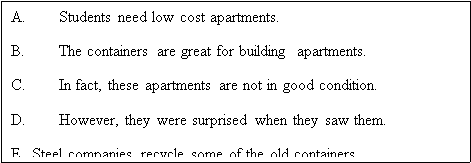
五、补全对话(5分)
请阅读下面对话,根据对话内容从方框中选择恰当的句子填人空白中,使对话通顺、合理,意思完整,并在答题卡上将其序号涂黑。(空一句,每小题1分)
A: Hi, how are you?
B: Not very well, I think I have the flu.
A: Oh no! You poor thing. 81
B: It might be, I suppose, but it doesn't feel like it. I've had it for a few days now. I just feel really weak and tired all the time.
A: 82 Maybe you should go home and get some rest.
B: Yes, you are right.
A:83
B: That’s true. Could you tell Mr. Smith I'm sick?
A: 84
 B: And could you give him my homework?
B: And could you give him my homework?
A: Sure.
B: Thanks.
A: No problem. 85
B: I’ll try my best. Thanks, Bye.
A: Bye. See you.
六、书面表达(15分)
微笑是人类最美的语言。某英文报以“Smiles”为题,举办中学生征文活动。请根据下面的图表信息,写一篇英语短文。内容包括:微笑的力量、你的微笑故亊以及故事给予你的启示。
提示:1.短文应包括图表中的全部信息,条理清楚,行文连贯;
2. 短文中不能出现真实的人名和地名;
3. 词数不少于80,开头已给出,不计人总词数。




![]()

![]()
![]()
Smiles
A smile is the most beautiful language of human beings.
2017江西省宜春市中考英语试题参考答案及评分意见
一、听力测试(共27小题,每小题1分,共27分)
1~5CBBAC 6~10ACBAA 11~15CBABB16~22CBCBACC
23. art room 24. Pictures 25. a new 26. The winner 27. 998-1203
二、单项填空(共8小题,每小题8分)
28~31DBCD 32~35CBDA
三、完形填空(共25小题,每题1分,共25分)
A)36~40CDABA 41~45DBCDB 46~50ACBDC
B)51. when 52. nervous 53. goals 54. make 55. protect 56. danger
57.to wam 58. quickly 59. without 60. harmful
(注:选对单词但形式错误,得0.5分)
四、阅读理解(共20小题,每题2分,共40分)
61~63ABD 64~67DAAC 68~71CDCB 72~75CBDB 76~80GAEBD
五、补全对话(共5小题,每天1分,共5分)
81~85DCGAF
六、书面表达
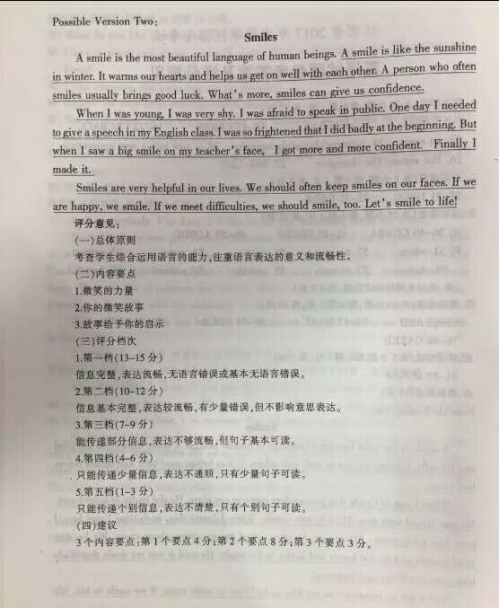

孔乙己是贫困潦倒的知识分子。在书中,孔乙己是一个知识分子,满口“之乎者也”,但是他很穷,还窃书,说过“读书人的事,怎么能叫窃,”被人嘲笑,他...
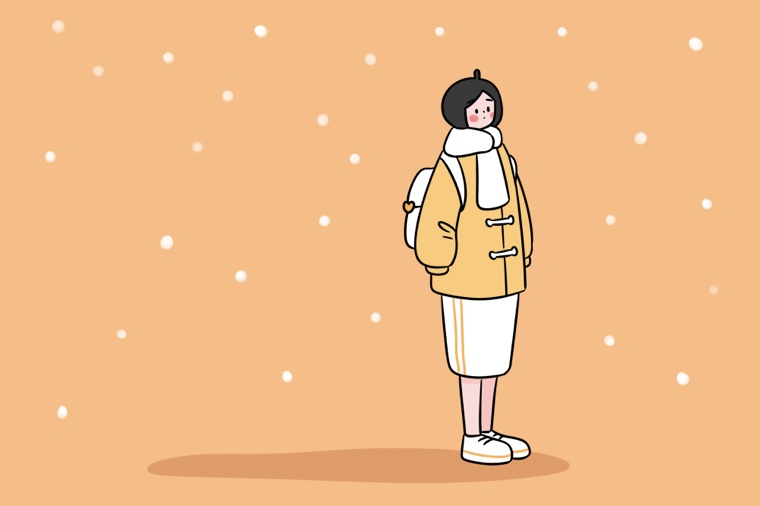
自然界产生氧气的化学方程式:光合作用的反应式为6CO2+12H2O→C6H12O6+6O2+6H2O。包括光反应和暗反应两个过程。需要具备光...
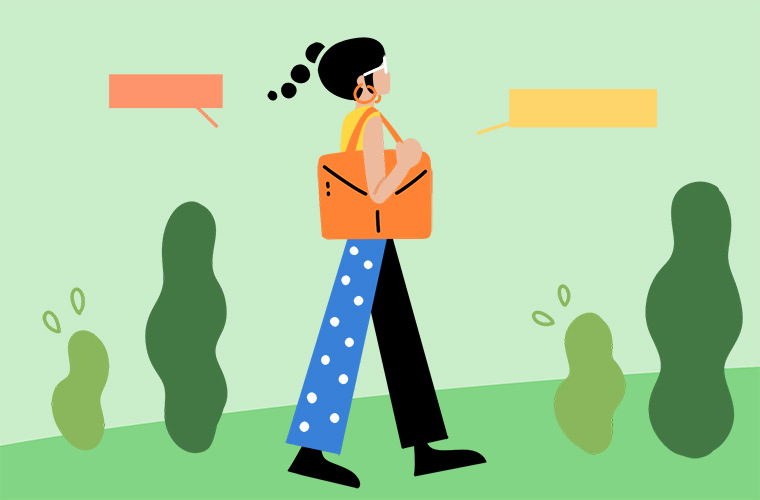
有的高校没有条件,只要学业水平成绩都合格就可以,比如中国科学院大学。有的需要平常学习考试成绩,比如北京外国语大学要求高三第一学期期末成绩在全...
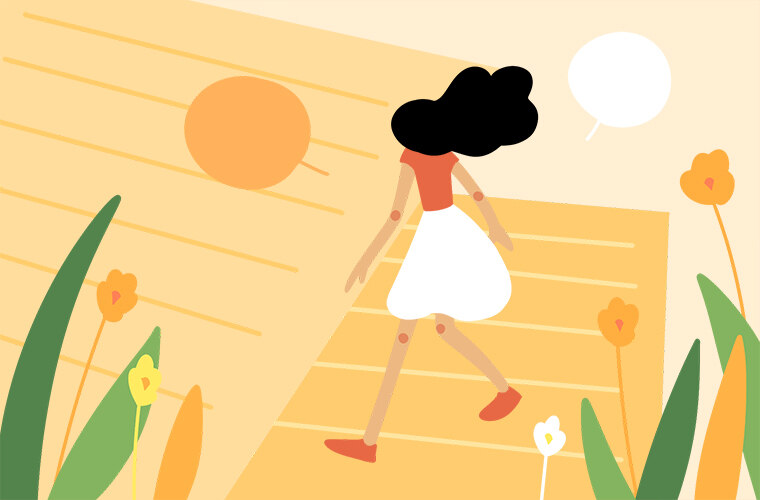
在四则运算中,表示计算顺序,在小括号之后、大括号之前;表示两个整数的最小公倍数;表示取未知数的整数部分;在函数中,表示函数的闭区间;在线性代...
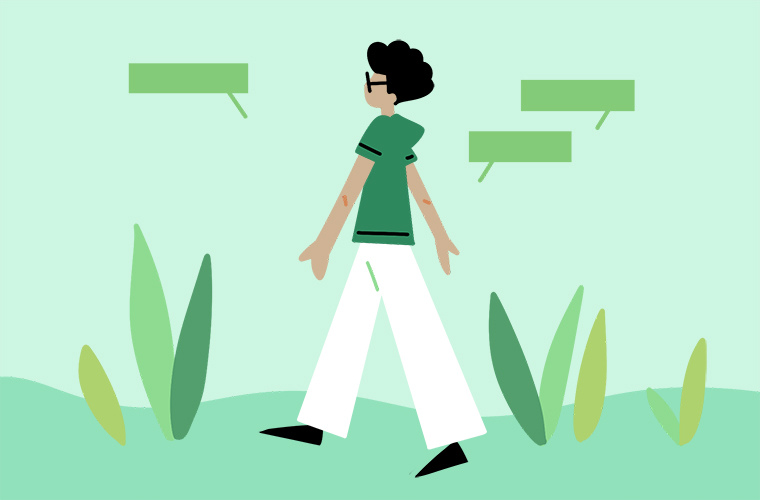
济南开设的最好的职高学校有:济南方信集团职业高中、济南公共交通职业高中。济南市公共交通职业高级中学是由济南市公共交通总公司承办,业务属济南市...

实然:是说事物实际上就是这样的,但不同于现实性(现实性指其有合理性和客观性);应然:就是应该是怎么样的意思,比如说这件事,就应该是那样的结果...

地中海气候一种夏季炎热干燥、冬季温和多雨,雨热不同期的气候类型。地中海气候冬季受西风带控制,锋面气旋频繁活动,气候温和,最冷月的气温在4-1...
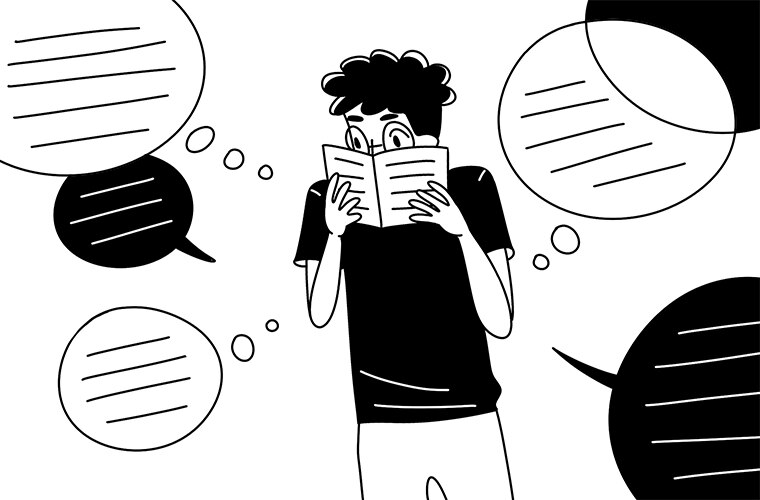
碱石灰,又称钠石灰,碱石灰是白色或米黄色粉末,疏松多孔,是氧化钙(CaO,大约75%),水(H₂O,大约20%),氢氧化钠(NaOH,大约3...